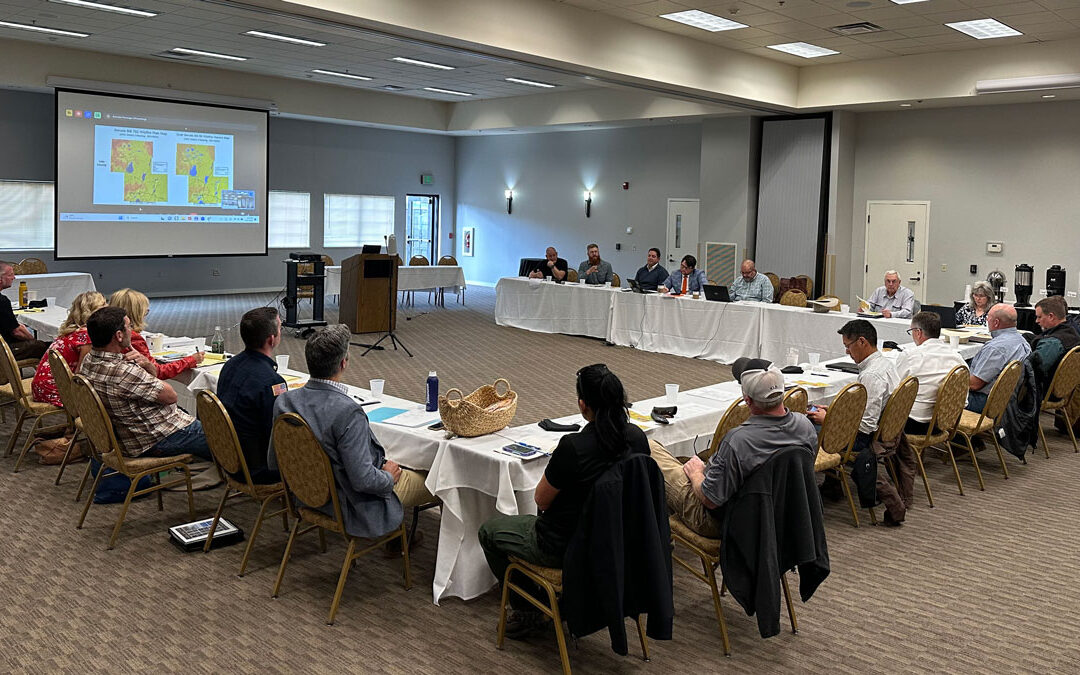
Oct 24, 2023 | AOC Advocacy, Health & Human Services
Oregon’s homelessness and fentanyl emergencies demand immediate fixes to problems decades in the making. Discussions in the state legislature and at the Association of Oregon Counties (AOC) seek policy solutions for meaningful progress in the 2024 short legislative session and beyond.
The Joint Interim Committee on Addiction and Community Safety Response was announced by legislative leadership in September in response to widespread dissatisfaction with the implementation and impact of Ballot Measure 110. The committee, led by Senate Majority Leader Kate Lieber and House Judiciary Committee Chair Jason Kropf, met for the first time on Oct. 18 and focused on the “demand” side of Oregon’s addiction crisis.
State and national experts provided testimony on substance use trends, prevention and treatment science, and what Oregon’s addiction response system needs to turn the tide. Researcher and clinician Dr. Kimberly Sue presented her findings and recommendations for designing nimble treatment systems for the fentanyl era. Her testimony, along with that of crisis service providers from across the state, underscored the need for immediate response capacity (modeled after police, fire and ambulance response) and smooth transitions for individuals moving through the continuum of care program, from peer-led outreach and harm reduction to detox and crisis stabilization, treatment, supported housing, and recovery services.
Witnesses cited eliminating the excessive administrative burden on existing providers and the red tape that is slowing or preventing the development of new workforce and new treatment facilities as opportunities for immediate improvement to addiction response in Oregon.
Testimony was also given on the efficacy of adequately funded local and statewide prevention initiatives and the lack of proper investment in every level of addiction prevention and response, most acutely in prevention and services for youth. The next committee meeting, on Nov. 6, during regularly scheduled “legislative days,” will focus on the “supply” side of the addiction crisis and public safety interventions.
AOC health and human services’ priorities for the 2024 short legislative session address discrete but key steps to create the responsive, coordinated public safety and health systems required to foster safe livable public spaces and healthy communities. AOC’s first priority is to establish a reliable process and schedule for the state to assess the cost of providing the core mental health and addiction services that counties are statutorily required to provide. Currently, Oregon Health Authority lead staff members do not have cost estimates for these services, and thus are unable to craft an agency recommended budget to match current or projected need.
AOC’s second priority for the 2024 session, a continuation of our 2023 priority, is to mitigate the liability risk shift to counties and their local providers for services to court-mandated populations, such as those persons ordered to community aid and assist restoration services. In the last few years, Oregon has sincerely begun to transition from an institution-based system to a community-based system to serve individuals in court-mandated behavioral health treatment. However, the system is not currently equipped to provide these services without an adequate investment in community service capacity or liability protection for counties and providers who serve a rising number of people, some with more acute and complex medical and mental health needs.
On Oct. 27, AOC will hold a joint meeting of its public safety and health and human services steering committees to prepare for expected efforts to fix Measure 110 in the 2024 session. AOC staff will field reports from public safety and community mental health program partners on current impacts of Measure 110, hear from the proponents of reform proposals currently in the public domain, and listen to member discussion of policy positions that will give Oregon counties the authority and tools they need to be healthy, vibrant, and safe.
AOC has also embarked on a longer-term health and human services summit series which kicked off on Oct. 2, with a dual purpose of elevating and propagating local solutions across the state and preparing counties to offer statewide solutions in the 2025 legislative session and beyond. The next meeting in this ongoing series will be Friday, Nov. 3, from 1 to 4 p.m.
Make sure to attend these educational sessions coming up at the AOC Annual Conference in Eugene, on Nov. 15:
- The Opioid Crisis and the Untapped Potential of Local Public Health Response and Prevention
- The 60th Anniversary of the Community Mental Health Act – Have We Realized the Vision?
- Oregon’s Local Homelessness Response Experiment: Preliminary Findings and Progress
Contributed by: Jessica Pratt | AOC Legislative Affairs Manager

Oct 23, 2023 | AOC Advocacy, Legislative Committee
The Association of Oregon Counties (AOC) Legislative Committee recently adopted eight top priorities for the upcoming 2024 legislative session. These items represent the most pressing policy issues faced by counties across the state, and have been discussed at AOC district meetings, the 2023 AOC legislative retreat in Klamath County, and during AOC policy steering committee meetings since the 2023 legislative session adjourned.
The AOC legislative affairs department, along with county commissioners, chairs, and judges, will advocate in the capitol this spring for the advancement of these priorities. “AOC looks forward to continuing our commitment to solutions-oriented advocacy and collaborating with our partners in the state legislature on policy to efficiently and effectively deliver county services to our shared constituencies,” said AOC Executive Director Gina Nikkel, PhD.
2024 Legislative Session Priorities
Community Development
Advocate for a fast-track process for limited urban growth boundary expansions that significantly increase affordable and workforce housing in all communities experiencing shortages of buildable land.
Governance and Revenue
Address problems arising out of the Tyler v. Hennepin County decision — limit county legal liability and create a standard process for how foreclosure surplus claims are handled.
Health and Human Services
Establish a statutory process and schedule for a cost study of core behavioral health services (local services required in statute).
Mitigate liability risk shift to counties and local system providers for mandated populations (aid and assist, civil commitment, and guilty except for insanity).
Natural Resources
Protect and enhance county authority, funding, and flexibility to support management policies and locally focused policy making processes across the Natural Resources portfolio.
Public Safety
Increase state investment in community corrections funding for the remainder of the 23-25 biennium.
Elevate the county voice in Measure 110 reform, supporting policy modifications that prioritize engagement in substance abuse treatment, provide sufficient funding for county services, and strengthen tools the criminal justice system can use to fight illegal drug use and sales.
Transportation
Advocate for the statutory authority for counties to charge cost-recovery fees for permits issued to utilities for work in the county road right of way.
View the 2024 Legislative Priorities online (PDF)
Contributed by: Mallorie Roberts | AOC Legislative Affairs Director

Oct 23, 2023 | AOC Advocacy, Natural Resources
Since the state legislative session adjourned in June, the natural resources portfolio at the Association of Oregon Counties (AOC) has been active implementing AOC’s policy priorities passed during the 2023 session and queuing up work for the upcoming 2024 short session.
Senate Bill 80 Regional Wildfire Hazard Map Meetings
Pursuant to Senate Bill 80 (2023), the Oregon Department of Forestry (ODF) and AOC hosted a series of wildfire hazard map meetings throughout the state, beginning the first week of September and concluding Oct. 11.
The State Insurance Commissioner, Building Codes Division Administrator, Oregon State University, ODF, and the State Fire Marshal traveled to nine locations around the state to engage directly with county commissioners, planners, administrators, and emergency managers. During these meetings, counties and ODF discussed the mapping process, hazard identification methodology, and details of the draft hazard maps. ODF will now begin updating the administrative rules to include information collected during those meetings, as well as factoring in the changes made in Senate Bill 80. Counties will be represented on the rules advisory committee, and can continue to raise issues to ensure necessary changes are considered.
Oregon Department of Fish and Wildlife Sage-Grouse Action Plan Update
The Oregon Department of Fish and Wildlife (ODFW) recently began conversations around updating the Oregon Statewide Sage-Grouse Action Plan. The Sage-Grouse Action Plan designates the core and low-density habitats encompassing the populations and assesses the effects these conservation strategies have on the communities where the bird resides. ODFW conducted public outreach around the habitat map updates and have now turned their attention to the “Greater Sage-Grouse Conservation Assessment and Strategy for Oregon: A Plan to Maintain and Enhance Populations and Habitat.”
AOC staff have been asked to serve on this agency strategy plan update. AOC originally produced the appendix in February 2011. AOC has also been asked to update “Appendix VI: Socio-Economic Profile and Analysis of Oregon Counties included in the Greater Sage-Grouse Conservation strategy for Oregon” by the end of this calendar year. AOC staff has begun this work and is gathering information from the eight impacted counties that are within the current range of the greater sage-grouse in Oregon.
Elk Depredation Program
This session, Rep. Bobby Levy (R-Echo) introduced House Bill 3052 (2023) which would have established a task force on elk and deer damage compensation funding. Although that bill did not receive a floor vote, the House Interim Committee on Agriculture, Land Use, Natural Resources, and Water under the chairmanship of Rep. Ken Helm (D-Beaverton and Cedar Hills), created an interim work group to find a path forward on this issue.
The workgroup is made up of 15 individuals and has two primary deliverables. First, they are tasked with producing a short report that documents the workgroup process, discussion, and recommendations on the ideal structure for the program. Second, the workgroup will find an appropriate level and source funding and develop bill language for the upcoming 2024 legislative session.
AOC staff will continue to keep the membership apprised of these activities and developments as the interim continues.
Contributed by: Branden Pursinger, AOC Legislative Affairs Manager

Oct 20, 2023 | AOC News
The Association of Oregon Counties (AOC) has hired Erin Good as the communications coordinator.
Good joins AOC with a strong background in communications and member service. She brings extensive experience in marketing, digital media, and program management, and will be an asset to the association.
“Erin will be a wonderful addition to the AOC team and I am confident her knowledge and past experience will provide an increased level of service to the membership,” said AOC Executive Director Gina Firman Nikkel.
Good comes to AOC from a similar role at the Oregon School Boards Association. Prior to this, she managed volunteer programs and communications for local education and advocacy non-profit organizations and taught English to speakers of Other Languages.
Good’s first day was Sept. 11, 2023.
Contributed by: Mckenzie Farrell | Operations Director

Aug 28, 2023 | AOC Advocacy
“Aid & Assist” Community Restoration Liability Study Underway
Work with the Oregon Department of Administrative Services (DAS) to study and recommend solutions to third party liability for community “aid and assist” community restoration services began at an initial meeting hosted by AOC on August 16. DAS risk staff are leading a study of the issue with help from county risk and legal experts and providers of community restoration services. The study report, along with recommended solutions, is due to the Legislature by February 1, 2024 thanks to the leadership of Senator Kate Lieber, the Governor’s office, and the coalition of counties and providers who crafted the language and budget note in SB 5506. In addition to the required study and recommendations, the legislature also set aside $2.9M to reimburse a county or its contracted provider for expenses resulting from litigation related to community restoration services.
Liability risk to counties and their providers related to the provision of community restoration services is a new and potentially catastrophic phenomenon arising from recent changes to state policy which aim to place as many individuals as possible in the community instead of the Oregon State Hospital where historically those services were exclusively provided. Eliminating the risk shift to counties arising from court-mandated community behavioral health services was a top 2023 legislative session priority for AOC.
Update on Statewide Homelessness Emergency Response and Technical Assistance NOFA
Disbursement of the $26M to expand homelessness emergency response statewide allocated in HB 5019 this past session is close to being decided by Oregon Housing and Community Services. About $6M will fund new shelter capacity for chosen projects from an RFP process, with the remainder to be divided among Local Planning Groups who responded to an RFP for rapid rehousing activities. Announcement of grant awards is expected in September. The Homeless Housing Response and Capacity Strengthening Notice of Funding Availability (NOFA) aimed at providing needed technical assistance to Balance of State communities has extended its pre-application deadline to August 25.
Governor Names New Emergency Management Director
Governor Kotek has named Erin McMahon as the new head of the Oregon Department of Emergency Management. She will take the place of acting director Matt Garrett who has overseen the rollout of the statewide homelessness emergency response alongside Oregon Housing & Community Services Director Andrea Bell. Both Director Garrett and Director Bell have met at least monthly since the Governor’s emergency declaration with AOC staff and the Local Government Advisory Committee for Health & Human Services to facilitate communication and problem solve rollout logistics.
Contributed by: Jessica Pratt | Legislative Affairs Manager

Aug 28, 2023 | AOC News
The Association of Oregon Counties (AOC) and League of Oregon Cities (LOC) are kicking off a planned series of virtual forums bringing city and county officials and staff together to coordinate, collaborate, and cultivate a shared understanding of local government interests in the future of Oregon’s transportation funding system.
The first meeting, held August 23, provided a detailed overview of federal, state, and local funding mechanisms and how these revenue tools work together to fund the current system [View Recording]. Presentations from the Oregon Department of Transportation, AOC County Road Program, and LOC reviewed the current system, with an emphasis on structural deficits and declining fuel tax revenues.
The AOC/LOC Transportation Funding Forum will continue to meet throughout the next year with an eye toward developing guiding principles and identifying priorities to inform AOC and LOC engagement in an expected transportation funding package during the 2025 legislative session. Forum conversations will also seek to increase transparent, partnership-oriented communication with state agencies, commissions, and the legislature related to transportation funding policy.
Future AOC/LOC Transportation Funding Forum meetings will feature regional case studies highlighting the diverse transportation priorities and needs of Oregon’s cities and counties, insight from national experts, and an exploration of mechanisms like congestion pricing and tolling, road usage or vehicle miles traveled fees, and local options.
Contributed by: Mallorie Roberts | Legislative Director

Aug 28, 2023 | AOC News
AOC Executive Director Dr. Gina Nikkel, Ph.D. will speak on a White House Office of National Drug Control Policy (ONDCP) webinar on September 27 that will focus on developing and applying for an 1115 waiver from the Centers for Medicare & Medicaid Services (CMS). During this webinar she will share Oregon’s process and discuss how Oregon would utilize the waiver if it were approved by CMS.
“The Association of Oregon Counties is focused on using the lessons and momentum of our joint pandemic response to grow the state-county partnership and begin to clear away some long-standing roadblocks in the system, like the Medicaid inmate exclusion policy,” Gina said.
The webinar will also include remarks from ONDCP Director Dr. Rahul Gupta and Sheriff Koutoujian from Middlesex County, Massachusetts as well as insights from California’s approved 1115 waiver.
“On January 26, the U.S. Department of Health and Human Services (HHS), through the Centers for Medicare and Medicaid Services (CMS), approved a first-of-its-kind Medicaid and Children’s Health Insurance Program (CHIP) section 1115 demonstration amendment in California, which will connect justice-involved people in jails and prisons with community-based Medicaid providers 90 days before their release to ensure continuity of care upon return to the community. For those that meet certain criteria, the demonstration will permit the use of federal Medicaid dollars for certain physical and behavioral health care treatment and community services to address health-related social needs,” NACo reported in February of this year.
Oregon is in the process of implementing a number of new 1115 waiver benefits, including for justice-involved individuals in jails and prisons. Acting Oregon Health Authority Director Dave Baden is engaging with the Local Government Advisory Committee (LGAC) during that process in order to incorporate the expertise of local human services system partners. His July presentation to the LGAC lays out the current thinking and timeline for new benefit implementation.
Contributed by: Jessica Pratt | Legislative Affairs Manager

Aug 28, 2023 | AOC News
The Department of Land Conservation and Development (DLCD) is accepting applications until October 2nd, 2023 for their Technical Assistance Grant program. Technical Assistance Grants are awarded on a competitive basis to fund local government planning compliance projects, land use ordinance updates, or comprehensive plan updates that align with the priorities in the Grant Allocation Plan.
DLCD has published an instruction packet for communities interested in the grants, and will hold a virtual informational session reviewing the grant process and timeline on Wednesday September 6th, from 1:30-2:30pm, which will include a question and answer period.
Interested communities are encouraged to contact their regional DLCD representative for guidance prior to submitting their application (find your regional representative here).
Contributed by: Michael Burdick | Legislative Affairs Manager

Aug 28, 2023 | AOC News
The National Association of Counties (NACo), the National League of Cities (NLC), and the Oregon Housing and Community Services Department (OHCS) have joined an effort to promote federal legislation expanding a powerful tool local governments can use to help finance affordable housing developments.
Local governments have been increasingly turning to Private Activity Bonds (PABs) to boost affordable housing construction and alleviate the affordable housing crisis. PABs are a type of municipal “conduit” bond that local governments can leverage to fund construction of buildings, infrastructure, or amenities that provide some public benefit but which are privately owned.
Governments who issue PABs aren’t borrowing any money – the debt is carried by the project developer, who enjoys a favorable interest rate as a result of the federal tax break on investors’ PAB income. Since PABs cost the feds in the form of lost income taxes, states are subject to PAB caps. With the growing popularity of PABs in Oregon, the caps have started to seriously constrain the ambitions of Oregon local governments. As the affordable housing crisis continues, local governments need all the tools they can get to address the problem. The Affordable Housing Credit Improvement Act (AHCIA) of 2023 (AHCIA, S. 1557 & H.R. 3238) would increase the cap on PABs, empowering local governments to get more public benefit projects built.
Call to Action!
Local government leaders are being invited to sign on to a letter supporting the AHCIA.
[Click here to view the letter supporting the AHCIA]
[Click here to sign on to the letter supporting AHCIA]
The deadline for local elected officials to sign on is September 7.
The ACTION Campaign is the main advocacy arm of this effort, and they’ve partner with the National League of Cities, National Association of Counties and the Mayors and CEOs for U.S. Housing Investment to circulate a sign-on letter from local elected officials—specifically, mayors, county executives, and county board chairs—to congressional leadership in support of the AHCIA.
Contributed by: Michael Burdick | Legislative Affairs Manager

Aug 28, 2023 | AOC News
Oregon is receiving millions of dollars from a federal grant program to help reduce gun violence, and the state is seeking a county representative to help decide how to spend the money.
The state is set to receive at least $7.5M from the federal Byrne State Crisis Intervention Program through 2026, which can be used to fund a variety of types of programs.
Oregon’s Criminal Justice Commission (CJC) is convening an advisory board to help them determine how to use the grant money, and they are hoping to recruit a county leader to serve on the board. The CJC anticipates the board will meet for about 90 minutes on a monthly basis.
Applications can be submitted here, and questions can be directed to CJC Senior Policy Analyst Bridget Budbill.
Contributed by: Michael Burdick | Legislative Affairs Manager










